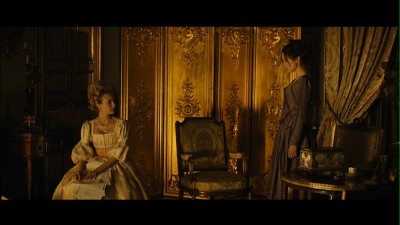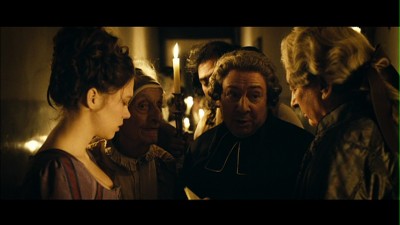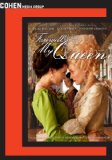| Reviews & Columns |
|
Reviews DVD TV on DVD Blu-ray 4K UHD International DVDs In Theaters Reviews by Studio Video Games Features Collector Series DVDs Easter Egg Database Interviews DVD Talk Radio Feature Articles Columns Anime Talk DVD Savant Horror DVDs The M.O.D. Squad Art House HD Talk Silent DVD
|
DVD Talk Forum |
|
|
| Resources |
|
DVD Price Search Customer Service #'s RCE Info Links |
|
Columns
|
|
|
Farewell, My Queen
Films about Marie Antoinette or more specifically, the French Revolution are nothing new. Sofia Coppola's pop-culture infused, eclectically cast, aptly titled "Marie Antoinette" represents to an extreme, the problem I have with modern period films in particular: they're just too polished and stylized, whether overtly or subconsciously. Films outside the specific topic of the French Revolution such as "The Other Boleyn Girl" and "The Duchess" are prime examples of the brand of pseudo-period film that the mainstream public will consume and in many cases, ultimately presume to be factual representations of life centuries ago and thousands of miles across the ocean. In 2012, "Les Miserables" largely caught the attention of audiences, adapting the musical based on Victor Hugo's saga of the June Rebellion in a very safe setting with an all-star cast. While "Les Miserables" could never be mistaken as an awful movie, it's a minor cinematic shame its in-your-face nature and gloss of mainstream polish caught the eyes of more people than the quietly released (in art house theaters) "Farewell, My Queen" a French film focusing on a side of Marie Antoinette and the French Revolution that goes ignored.

The film follows the character of Sidonie Labrode (Léa Seydoux), the servant of Marie Antoinette (Diane Kruger) in the Palace of Versailles at the very beginning of the French Revolution. Directed by Benoit Jacquot, the film may be fictional in nature, but it manages to capture a humanity and more importantly, a slightly less refined view of aristocracy that makes it feel far more realistic than a finely polished (and sanitized) "based-on-a-true story" tale could ever hope to aspire to. The film's methodical but highly natural pace actually tells us very little about our characters until the middle of the second act; instead the camera offers the viewer the role of something akin to a silent observer in the rule, with numerous shots feeling incredibly steady and balanced in nature. It's not until the shocking reveal of the list of "heads" to be claimed midway through the movie and Sidonie's relationship with Marie-Antoinette takes the forefront that Jacquot chooses to play with the camera in a more daring fashion. Scenes of dread and confusion are infused with zooms uncharacteristic to the genre.

"Farewell, My Queen" bucks the trend of the "mainstream" period drama by refusing to telegraph developments (even if they are obvious due to their historical nature) and even though we as the audience know the Revolution and its bloody effects are coming, we feel shock and twinges of sympathy for the characters immediately affected by the developments. Most of all though, we feel that sense of confusion and uncertainty by our connection to Sidonie, whose very existence is turned upside down. Seydoux brings grace and humanity to the role a contrast to Kruger's commanding but still vulnerable performance as an aristocrat who is callous at heart. Kruger's casting is incredibly curious as she's the only principle cast member who is not French, but her skill as an actress (as many realized from "Inglorious Basterds) erases any glaring trace that culturally, she's the outsider in the film. Both actresses handle the racier parts of the story quite admirably and to be honest, the whole film itself never strays into exploitative or lewd territories, where such an approach might have ensured at minimum, more pre-release hype.

Throughout the film Jacquot keeps us centered at Versailles and isolated from the world at large, thus creating a filmic atmosphere that reminded me of the phenomenal "Ridicule." The sets are natural and never overly extravagant, despite their underlying nature being just that. Even more refreshing is that removal of artificial polish to everything from the physical all the way to the dialogue. "Farewell, My Queen" feels incredibly real, even in moments that stray into slight melodrama and the focal point is not the surroundings but the emotions and relationships of the characters: their loves, their failings, their strengths, and their ignorance. It might be a long time before audiences get a period film like "Farewell, My Queen," but in the meantime, the film is out there waiting to be discovered, only a year after its quiet nearly non-existent release. It should never be mistaken as a substitute for something like "Les Miserables," which truth be told, is an entirely different beast then this, but for the aficionado as a period piece, its mandatory viewing for its contrast to the norm.
THE DVD
The Video
The 2.35:1 anamorphic widescreen transfer nails what is likely the intended look of the film, but is not without a few glaring faults. The color palette is ever so slightly dialed back, but at the same time, detail feels overly soft, while there is some minor muddled digital noise/grain. Contrast levels feel more natural, but a few scenes here and there feel a bit too light. The color reproduction though does capture a more natural look very well and is a welcome change from other attempts at period drama going overboard with saturated colors and overly dim locations.
The Audio
The Dolby Digital French 5.1 soundtrack captures the atmosphere of the interior locales quite nicely, giving a needed subtle resonance to dialogue in more expansive, stone rooms, while giving dialogue in tight quarters a closeness. The surrounds feel like they could have been used to greater effect or mixed a little more strongly, while the low-end is sparse, but not necessarily needed. A French 2.0 track is also included as are English subtitles.
The Extras
The extras consist of a few on-set interviews, an extended interview with the film's director and the original theatrical trailer.
Final Thoughts
"Farewell, My Queen" is quite small in scale, despite the huge events in the background, continually driving the narrative forward. It's a phenomenal film, more for the little things it does, namely its subdued production design an methodical pace. Well cast and smartly written, it's a great addition to the period drama and deserves a wider audience. Highly Recommended.
|
| Popular Reviews |
| Sponsored Links |
|
|
| Sponsored Links |
|
|
| Release List | Reviews | Shop | Newsletter | Forum | DVD Giveaways | Blu-Ray | Advertise |
|
Copyright 2024 DVDTalk.com All Rights Reserved. Legal Info, Privacy Policy, Terms of Use,
Manage Preferences,
Your Privacy Choices | |||||||













